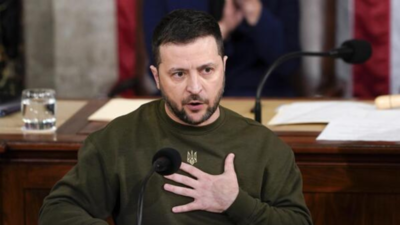Ukraine’s President Volodymyr Zelenskyy refused to give the United States half of its mineral wealth in return for support from the Trump administration.
The US proposed a deal where they would give support to Ukraine and in return they would get 50 percent ownership of Ukraine’s mineral deposits, including graphite, lithium, and uranium.
Declining the proposal, Zelenskyy said that the document was too focused on US interests as it did not offer any specific security guarantees in return, according to one current and one former senior Ukrainian official familiar with the talks, New York Times reported.
Zelenskyy’s decision not to accept the proposal, at least for now, was described as “short-sighted” by a senior White House official.
“I didn’t let the ministers sign a relevant agreement because in my view it is not ready to protect us, our interest,” Zelenskyy told The Associated Press on Saturday in Munich.
US treasury secretary Scott Bessent, who presented the offer in Ukraine, stated on Sunday that the US sought these minerals as compensation for provided aid, leaving ambiguous whether this covered future assistance.
Sources briefed on the proposal indicated that the Trump administration’s interests extended beyond minerals to include oil and gas resources. The arrangement would have entitled the US to half of Ukraine’s resource-generated income, which currently supports the country’s defence and military production.
The mineral-sharing request was made during Bessent’s Kyiv visit on Wednesday, marking the first Trump administration official’s visit to Ukraine. The Treasury Department offered no comment on the negotiations, AP news agency reported.
The Ukrainians planned to review the details and present a counter-offer when Zelenskyy attended the Munich Security Conference and met Vice President JD Vance on Friday, according to the second Ukrainian official.
Security assurances are crucial, as Ukrainians believe the US and Britain failed to honour their Cold War-era protection commitments when Ukraine relinquished Russian nuclear weapons on its territory.
European diplomats criticised the offer as reminiscent of colonialism, when Western nations exploited smaller countries for resources.
Ukraine possesses 109 significant mineral deposits, including titanium, lithium and uranium ores, plus oil and gas fields, as documented by the Kyiv School of Economics. Some deposits lie in Russian-occupied territories or near the front line.
The value remains uncertain due to potential Russian reinvasion risks post-ceasefire and Ukraine’s challenging business environment, characterised by complex regulations and insider dealings, which have historically deterred investment.
Previous US-Ukraine business arrangements under Trump include a 2017 deal for Ukraine to purchase Pennsylvania coal, replacing supplies lost to Russian occupation after the 2014 invasion. Kostiantyn Yelisieiev, a former diplomat involved in the 2017 agreement, noted it benefited Trump politically whilst securing lethal military aid for Ukraine through Javelin missile sales.







